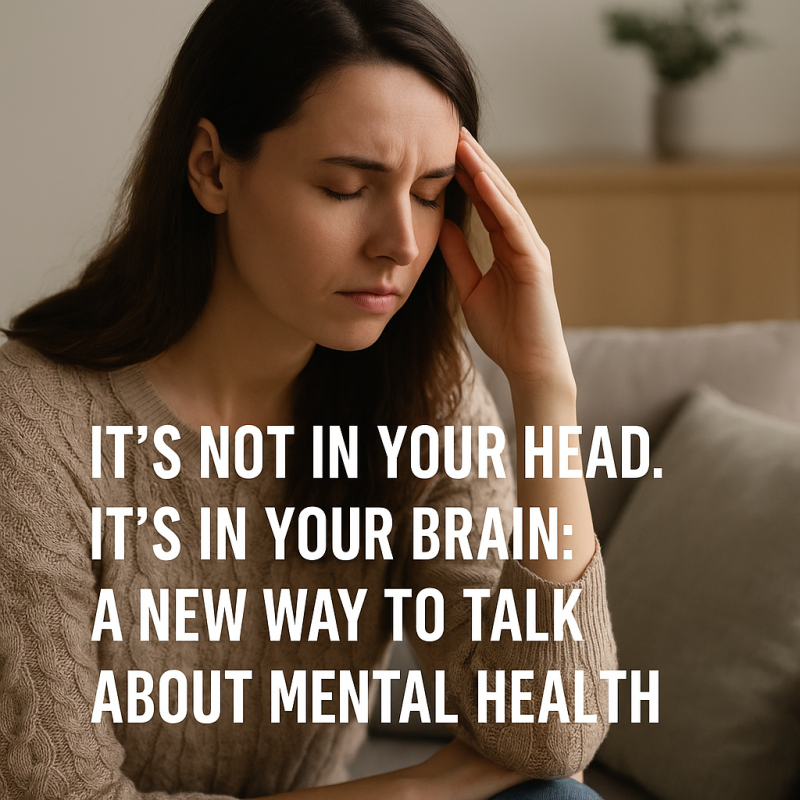
Dear heart on a healing journey,
No one feels ashamed when they are diagnosed with cancer, diabetes, or heart disease. These conditions are treated with seriousness and compassion, even though lifestyle choices often contribute to their development. There is no stigma when someone seeks medical attention for high blood pressure or chest pain. They are met with concern, care, and support.
So why is it so different when the condition involves the brain?
When someone experiences depression, panic attacks, addiction, or bipolar disorder, the response is often one of discomfort or silence. Instead of support, they face judgment. Instead of understanding, they often feel shame. Mental health struggles are still widely misunderstood. Many people internalize their symptoms as signs of weakness or personal failure. That shame becomes a wall that keeps them from reaching out, and it holds them back from healing.
But what if we changed the way we talk about it?
What if mental health is not simply about emotions or willpower?
What if it is about the brain?
The human brain is an organ. It is the control center of every thought, mood, memory, and behavior. Like the heart or liver, it can be injured, inflamed, or imbalanced. It can struggle due to stress, trauma, poor sleep, lack of nutrients, or even genetics. And just like other organs, it needs support and care when it is not functioning well.
People do not wait until they have a heart attack to take their heart seriously. They see a cardiologist when they have risk factors. They change their diet, reduce stress, and monitor their blood pressure to prevent problems. So why do we wait until someone is in emotional crisis before we take their brain health seriously?
To illustrate the impact of this shift, I want to share a story. I will call my client Sarah.
Sarah was 28 years old when she came to therapy. On the surface, her life seemed fine. She had a stable job, a kind partner, and no obvious trauma. But inside, she felt like she was falling apart. She struggled with panic attacks, racing thoughts, emotional crashes, and long, sleepless nights. The hardest part for her was not the symptoms themselves. It was the shame.
“I do not understand why I feel like this,” she told me during our first session. “Maybe I am just not strong enough.”
But Sarah was strong. Her brain was simply overwhelmed.
Over time, she began to learn that what she was experiencing was not a flaw in her character. It was a message from her brain asking for help. When she understood that her emotional distress had a biological basis, everything changed. With therapeutic support, education, and lifestyle changes that nourished her brain, Sarah began to recover.
“I wish someone had told me sooner,” she said later. “That this was not my fault. That I could actually get better.”
This is the power of reframing mental illness as brain health.
When people stop asking, “What is wrong with me?” and start asking, “What does my brain need?” they begin to heal. That question leads to real answers. It opens the door to compassion, curiosity, and science-based solutions.
As Dr. Amen, a pioneer in brain health research, says, you are not stuck with the brain you have. You can make it better.
This shift in language and thinking changes everything. It reduces shame. It increases understanding from families and loved ones. It motivates people to take action. It leads to better treatment outcomes and more sustainable healing.
When people believe their brain can get better, they begin to believe that they can get better too.
There is a Japanese proverb that says, “Fall seven times, stand up eight.” But standing up becomes possible only when we stop blaming ourselves for falling.
Mental health is not a weakness. It is not a failure. It is your brain asking for care.
It is time we speak honestly about that. It is time we stop whispering about mental illness in shame and start talking boldly about brain health. Because when we do, everything begins to change.
Healing becomes possible.
Hope returns.
And people begin to feel like themselves again.
Yours in healing,


